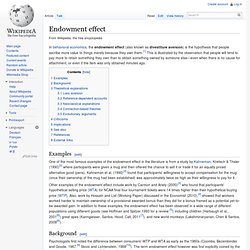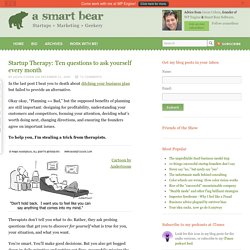

Business & Mngmt. Endowment effect. In behavioral economics, the endowment effect (also known as divestiture aversion) is the hypothesis that people ascribe more value to things merely because they own them.[1] This is illustrated by the observation that people will tend to pay more to retain something they own than to obtain something owned by someone else—even when there is no cause for attachment, or even if the item was only obtained minutes ago.

Examples[edit] One of the most famous examples of the endowment effect in the literature is from a study by Kahneman, Knetsch & Thaler (1990)[2] where participants were given a mug and then offered the chance to sell it or trade it for an equally priced alternative good (pens). Kahneman et al. (1990)[2] found that participants' willingness to accept compensation for the mug (once their ownership of the mug had been established) was approximately twice as high as their willingness to pay for it.
Background[edit] Theoretical explanations[edit] Loss aversion[edit] Criticisms[edit] How To Write A Business Plan. Career planning.
Jedi Mind Tricks: 17 Lesser Known Ways to Persuade People. Want to know how to persuade people online and get what you want? The power of influence is usually all that separates the successful from everyone else. These are some tactics, discovered through psychological research, that you have probably not yet heard about, but have the potential to increase your persuasive abilities. I’m not going to cover reciprocity, scarcity or social proof and all those widely known persuasion principles. You already know all about those (in case you don’t, stop everything and read this book by Cialdini). Related: How Nike’s Making Persuasive Product Pages 1. The best way to persuade audiences that are not inclined to agree with you, is to talk fast. Want to boost persuasive power? Don Moore from Carnegie Mellon’s Center for Behavioral Decision Research has published research showing that confidence even trumps past accuracy in earning the trust of others.
People naturally associate confidence with expertise. 2. Light swearing, that is. Image credit 3. 4. 5. 6. Larry Smith: Why you will fail to have a great career. Startup Therapy: Ten questions to ask yourself every month by. In the last post I beat you to death about ditching your business plan but failed to provide an alternative.

Okay okay, “Planning == Bad,” but the supposed benefits of planning are still important: designing for profitability, understanding your customers and competitors, focusing your attention, deciding what’s worth doing next, changing directions, and ensuring the founders agree on important issues. To help you, I’m stealing a trick from therapists. Cartoon by Andertoons Therapists don’t tell you what to do. Rather, they ask probing questions that get you to discover for yourself what is true for you, your situation, and what you want. You’re smart. That’s where this article comes in: To splash cold water on your face, forcing you to face reality and continue to defend or change the important choices inside your business. What follows is your startup therapy session. In one sentence, what does your product do and who buys it?
What tips do you have? Cartoon by Andertoons You’re smart. Career planning. Learn Ideas and Tips.